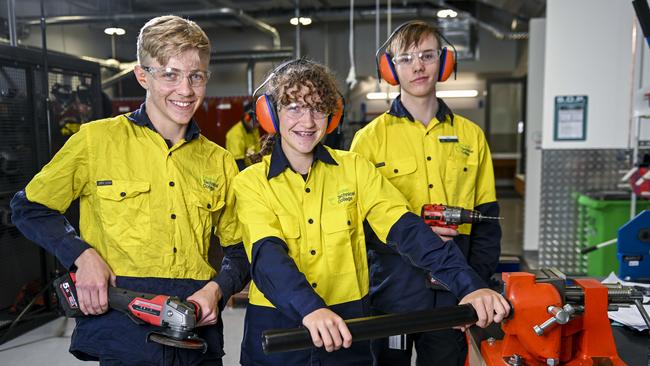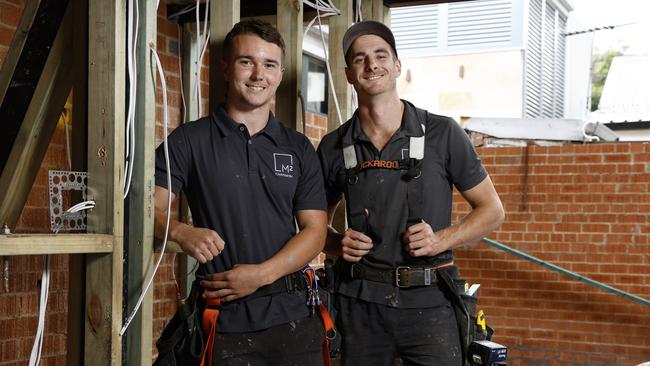Fee-free TAFE for high-schoolers and apprentices eyeing housing construction trades
High school students looking to work in housing construction will get a major headstart with free pre-apprenticeship programs that can slash hundreds of hours of study off their trade.
National
Don't miss out on the headlines from National. Followed categories will be added to My News.
High school students looking to work in housing construction will get a major headstart with free pre-apprenticeship programs that can slash hundreds of hours of study off their trade.
About 5000 TAFE and VET introductory courses in areas like carpentry, plumbing, and electrical will be made free for Year 11 and 12 students over the next two years as part of a $90.6m construction workforce package in the upcoming federal budget.
School students who complete pre-apprenticeship certificate II level courses, which take between 600 and 1200 hours of study, gain foundational and basic skills relevant to their chosen trade as well as industry experience.
To entice more young Australians into the construction sector the Albanese government is investing $26.4m to make thousands of early courses free, which will save students between $1,130 and $2,600 for certificates in skills like plumbing, building and electrotechnology.
Labor will announce the skills funding on Tuesday, which will also include a $62.4m investment in a further 15,000 fee-free courses over two years for post-school apprentices covering a wider range of skills relevant to residential construction, from electricians and builders to surveyors and drafts people.

The budget handed down on May 14 will also include $1.8m to streamline skills assessments for about 1,900 potential migrants from countries with similar accreditation to Australia want to work in the construction and housing sectors.
The government will also prioritise about 2,600 trades assessments in housing construction occupations.
Master Builders Australia chief executive Denita Wawn said workforce shortages were the “biggest source” of cost pressure for the building industry.
“Despite a sizeable workforce of 1.35 million Australians, the industry has an annual exit rate of eight per cent and we are only replacing half of those people per year,” she said.
Ms Wawn welcomed moves to boost the number of domestic tradies and make it easier for migrants to work in the industry.
Housing Industry Association chief economist Tim Reardon said the skills shortage in the housing construction sector were “more acute” than at any other point during the last 20 years, excluding the peak of the pandemic.
“The industry does need to improve its ability to attract young school leaders, despite high wages and improving work conditions, we continue to face a significant shortage for skilled trades,” he said.

HIA data shows trade prices increased by 6.2 per cent in the year to March 2024 due the shortage, with electrical, joinery and plumbing trades availability going backwards last quarter.
Skills and Training Minister Brendan O’Connor said Labor’s extra skills investment would support construction job pathways and strengthen Australia’s capacity to build residential housing.
“This is a great opportunity for people to gain a trade while accessing government incentives and reduce cost of living pressures through more affordable housing,” he said.
Housing Minister Julie Collins said more homes would mean more affordable options for buyers, renters or Australians in need of emergency accommodation.
“But to build more homes we need more tradies, and that is what this announcement will deliver,” she said.

Second year apprentice at M2 Carpentry in Sydney Benny Mitchell, 18, said he supported moves by governments to ease the financial barriers to entering a trade.
“I chose carpentry because of the variety work, not being stuck outside and getting to work with your hands,” he said.
“But I think a lot of people leave midway through their apprenticeships generally because of money.
“More support like free TAFE would definitely help.”
Third year apprentice Louis Taylor, 29, who chose to pursue a carpentry qualification after working different jobs within the construction industry, agreed incentives would encourage more Australians to take up a trade.
“Any incentives to get people into a trade can only be a good thing,” he said.
Mr Taylor said he enjoyed working in residential building as there was “great job satisfaction” working directly with clients on the home they will ultimately live in.
M2 Carpentry owner Mark Cook said more supports for young people to meet the costs of starting a trade and to encourage businesses to take on more apprentices would be welcome.
“For apprentices it’s an expense to get set up buying the tools of the trade and a car, so a special grant for these would go a long way,” he said.





